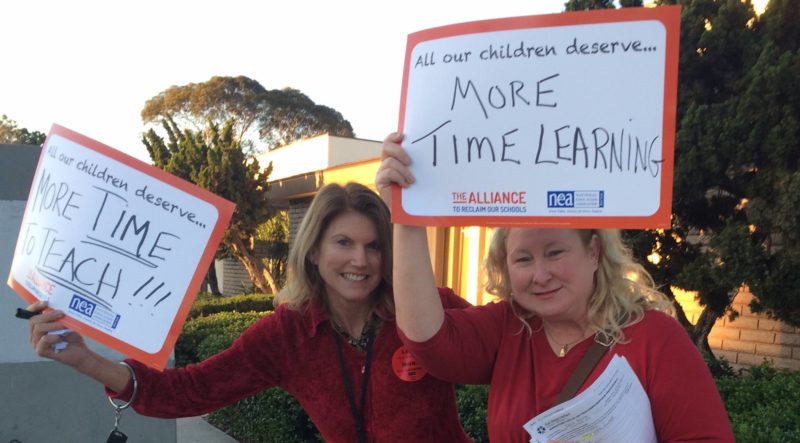 A picture may be worth 1,000 words, but the whopping 26-page, color-coded spreadsheet of the hundreds of standardized tests required annually of the students of Jefferson County, Kentucky, mostly provokes silent awe.
A picture may be worth 1,000 words, but the whopping 26-page, color-coded spreadsheet of the hundreds of standardized tests required annually of the students of Jefferson County, Kentucky, mostly provokes silent awe.
Line after line, test after test, “this is a student’s eye view” of standardized assessment in Jefferson County, explains Jefferson County Teachers Association (JCTA) Vice President Tammy Berlin, who assembled the document. It includes 320 mostly multiple-choice tests, each at least an hour long and required by the school district, not state or federal government. Berlin coded them a bright red.
“Red for stop,” she explains, “because we’re already giving enough tests and we don’t need to be giving these.” The time spent on mandated testing adds up to at least three to five weeks in Jefferson County, and that’s a huge amount of time that could be much better spent on teaching, she adds.
“The teachers’ frustration is: We don’t have time to teach!” she exclaims.
That frustration isn’t unique to Jefferson County. Educators across the U.S. want more time to teach, and less time spent on standardized testing. In dozens of states, educators, parents, and other community members have been organizing together, holding energetic rallies and petition drives, and working toward a public school system that supports student learning.
In San Diego this month, where a San Diego Education Association (SDEA) survey found that 90 percent of San Diego educators believe students are being harmed by the overuse of standardized tests, school officials announced they were slashing the number of district-required high-stakes standardized tests. “San Diego’s teachers are thrilled to learn that the district has listened to the concerns of nearly 7,000 educators who have said the current system of high-stakes testing is broken,” said SDEA President Lindsay Burningham.
Trusting Educators
This spring, Jefferson County teachers brought their organizing efforts to a school board meeting, where high school math teacher Ryan Davis delivered a petition signed by every teacher at his school required by the district to give “diagnostic” and “proficiency” assessments. Those assessments occur every three to four weeks roughly, from second to eleventh grades, and undermine what Davis and his colleagues would like to do for students in terms of deeper, individualized learning and authentic assessment.
“What gets measured, gets done,” Davis told school board members. And since these tests measure low-level, rote learning through simplistic, multiple-choice questions, “what gets done is a narrowing and shallowing of expectation and content that moves us further away from a goal of deeper learning.”
 In Jefferson County, Ky., three to five weeks is spent on mandated testing every year.
In Jefferson County, Ky., three to five weeks is spent on mandated testing every year.
Davis also pointed out that the tests encourage teachers to move through their curriculum at a predetermined pace, no matter what their individual students actually need. “Instructional decisions are predicated not on the needs of students, but on the needs of a test,” he added.
Eighty-four percent of teachers in Jefferson County have master’s degrees, including Davis. “These are folks who have the skills, experience, and background to have professional judgment,” points out JCTA President Brent McKim. When district officials insist on the frequent use of standardized multiple-choice tests to monitor students and teachers, “what they’re really saying is ‘we don’t trust you to have the professional capacity to understand if a child in your class is getting it or not, but we do trust a really lousy multiple-choice test.’ It’s a slap in the face to the professional judgment of teachers.”
What’s the Alternative?
Jefferson County teachers are fed up—and they are organizing for a new approach to learning. Union leaders are consulting with the nationally respected Center for Teaching Quality (CTQ) and leading efforts on the district’s task force for deeper learning. The petition presented by Davis was the first by JCTA members this year, but it definitely won’t be the last.
Take Action
For more information on Time to Learn campaigns, and to get resources like NEA’s Time to Learn school board resolution, visit nea.org/timetolearn.
It also wasn’t the first step in their efforts to make time for student learning, and restore control of classrooms to the people who know best about curriculum, lesson pacing, mastery of learning, and authentic assessment of learning. “We’re seeding the cloud so that it rains good stuff,” says JSTA President McKim.
What that means is that last year union leaders took hold of the re-writing of the school district’s “Vision 2020,” a five-year strategic plan, and steered its focus to “deeper learning” for students and professional practices for teachers. This is the really good stuff. The plan, which was approved by school board members this past winter, also calls for more individualized learning.
McKim sees the visioning plan as the “fulcrum of a lever that can be used to pry open” the district’s policies and assessments.
“This is your vision! And you can’t (achieve) your vision without changing what you’re doing,” he tells school board members. “We’ll never achieve deeper learning if we’re shackled to a multiple-choice test every three weeks,” he points out, “and you’ll never achieve individualized learning if every kid is expected to be in exactly the same place as every other kid every three weeks.”
Photo: San Diego Education Association







